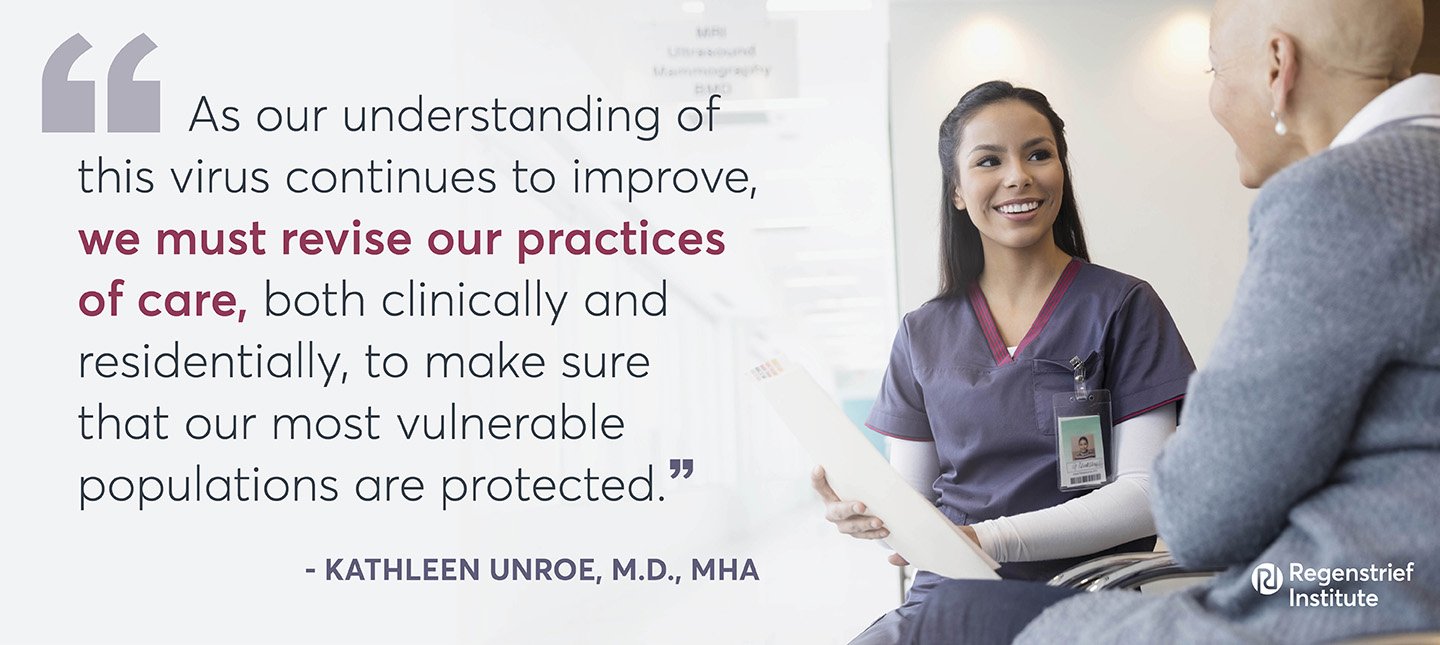Older adults are at elevated risk for complications from COVID-19 and are dying at a higher rate than younger patients. In light of these concerns, Regenstrief Institute and Indiana University School of Medicine scientist Kathleen Unroe, M.D., MHA, and colleagues lay out guidelines and best practices for healthcare providers and family caregivers who are providing care for seniors during the COVID-19 pandemic. Their recommendations are published in the Journal of Geriatric Emergency Medicine.
“Our senior patients need additional measures of care and protection, and COVID-19 only exacerbates those needs,” said Dr. Unroe, one of the authors on the paper. “Family care providers need to be aware of the hazards COVID-19 presents to their loved ones and understand how to mitigate them. I hope this information will provide helpful guidance to protect older adults during this crisis.”
In the article, Dr. Unroe and her colleagues provide insight into several aspects of how the novel coronavirus is affecting the care of older adults.
Testing Seniors For COVID-19
Dr. Unroe and her colleagues highlight the need to prioritize testing for older adults even after increased screening capacity is available, due to their increased risk of complications from the disease. They advise health systems to make testing available in settings other than the emergency department whenever possible and to use options such as telecare in the screening process.
Caring for Older Adults during COVID-19 Outbreak
Older adults may be experiencing significant isolation already, and social distancing may worsen complications from seclusion, Dr. Unroe and her team note in the paper. Reduced time with caregivers may also place older adults at risk, due to missed opportunities to catch cognitive or general health decline and unrecognized falls.
If protective equipment is necessary for caregivers to wear around patients with cognitive decline, this change in appearance may be very disorienting for patients, and patients with dementia who are required to wear protective equipment may not understand why they are doing so. Dr. Unroe and her team recommend that clinicians provide additional resources to caregivers and steer them toward communities of support.
COVID-19 Symptoms in Older Adults
While fever and respiratory symptoms have been widely recognized as key symptoms associated with COVID-19, these symptoms often present differently in older adults. Fever, for example, may be blunted or absent entirely during infection for older adults. Respiratory symptoms may either be masked or exacerbated by co-occurring diseases, such as COPD, that can further worsen outcomes. Dr. Unroe and team point to the Infectious Disease Society of America’s modified definition of fever for older adults as a helpful alternative:
- A single oral temperature over 100°F, or
- 2 oral repeated temperatures over 99°F or
- An increase in temperature of 2°F over the baseline temperature
The article also features key points, evidence and case studies surrounding other issues of elder care, including transitions in care between sites such as nursing homes and hospitals, guidance for triage, and suggestions for inpatient care systems changes.
“As our understanding of this virus continues to improve,” said Dr. Unroe, “we must revise our practices of care, both clinically and residentially, to make sure that our most vulnerable populations are protected.”
“COVID-19 in Older Adults: Key Points for Emergency Department Providers” is available now in the Journal of Geriatric Emergency Medicine. In addition to Dr. Unroe, authors included Kevin Biese, M.D., of University of North Carolina Medical School; Alice Bonner, PhD, R.N., FAAN of the Institute for Healthcare Improvement; Teresita Hogan M.D., FACEP of University of Chicago Medical Center; and Patti Pagel and Michael L. Malone, M.D., of Advocate Aurora Health.
About Kathleen Unroe, M.D., MHA
In addition to being a research scientist in the IU Center for Aging Research at Regenstrief Institute, Kathleen Unroe, M.D., MHA, is an associate professor of medicine at the IU School of Medicine and a practicing geriatrician.
About Regenstrief Institute
Founded in 1969 in Indianapolis, the Regenstrief Institute is a local, national and global leader dedicated to a world where better information empowers people to end disease and realize true health. The Regenstrief Institute, a key research partner to Indiana University, and its researchers are responsible for a growing number of major healthcare innovations and studies. Examples range from the development of global health information technology standards that enable the use and interoperability of electronic health records to improving patient-physician communications, to creating models of care that inform practice and improve the lives of patients around the globe.
Regenstrief Institute is celebrating 50 years of healthcare innovation. Sam Regenstrief, a successful entrepreneur from Connersville, Indiana, founded the institute with the goal of making healthcare more efficient and accessible for everyone. His vision continues to guide the institute’s research mission.









